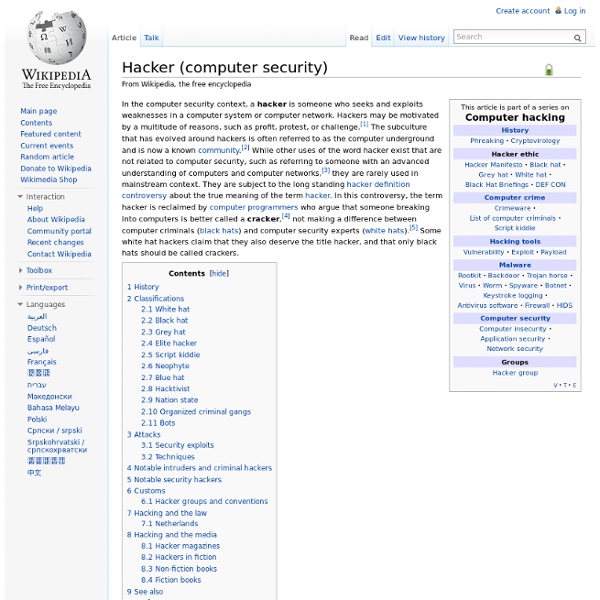Hacker (computer security)

2600: The Hacker Quarterly
How To Understand Programs for Password Hacking | How To Do Things
Password hacking may sound like an ominous thing to most people, who also believe that someone who may know how to do it can't possibly be up to any good. On the contrary, it can actually be most useful for you or potential clients. You wouldn't know when you would need to hack your own email account in case you forgot your password, or an important client needs your help to crack a program password. Dictionary attacks. Password hacking is still a skill that not everyone can do.
Tutorial Start Hacking - Hackers Dot NL
Throughout the site, you may see the term HDNL. This is an acronym for our community coming from: Hackers Dot NL. You are probably very excited to start hacking, and you should know that being a hacker is an adrenaline rush as well as fullfilling. To begin hacking, you need to learn a programming language such as(c/c++/perl/php/java) and study certain operating systems such as(windows NT,2000/Linux/Unix). Ask other hackers what they use and why, then choose one and stick to it. All 3 types of hackers may have detailed knowledge of system security and programming, but how they use their knowledge is what makes them very different. 1. 2. 3. See the difference? After learning an advanced operating system, and/or programming, you will be able to understand how exploits work and how systems are compromised. HDNL can help you to advance your computer skills by providing a place to ask questions, read articles, and see how exploits work. Here is an example of a question you shouldn’t ask: 1.
Networking Fundamentals
Networking Fundamentals In order to get the most of The TCP/IP Guide, a certain level of knowledge regarding the basics of networking is very helpful. Unlike many other resources, however, I did not want to start with the assumption that my reader knew what networking was all about. After all, that's why you are reading this Guide! So, I decided to include this section, which provides an overview of some of the basic issues related to networking. In this section I have provided several subsections that introduce networking and talk about some of its most important fundamental concepts. Home - Table Of Contents - Contact Us
Crack Windows Passwords
Have you ever tried to log into a Windows computer for a few minutes and you finally realize that you forgot the password? There’s a way to crack the password and it doesn’t involve reformatting and reinstalling Windows. The solution is called @stake LC4 (formerly L0phtCrack), however since Symantec stopped development of L0phtcrack, I’m going to let you in on a program called LC5. Just like L0phtCrack, LC5 attacks your Windows machine with a combination of dictionary and brute force attacks. LC5 can crack almost all common passwords in seconds. The main purpose of the LCP program is user account passwords auditing and recovery in Windows NT/2000/XP. I haven’t tested it against Windows Vista yet, so I’m not sure if it will work. How it works: Windows NT, 2000 and XP passwords are stored as encrypted hashes. Eventually the correct password will be sent and then displayed to the screen. Good intentions: System administrators can find weak passwords within minutes. Bad intentions:
Virtual Domicile of Steven K. Baum
Related:
Related:



